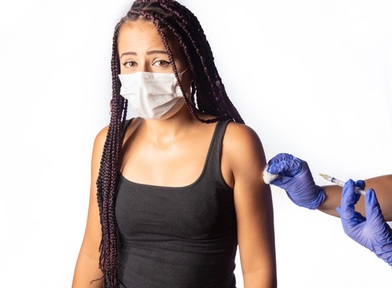Government proposes making Covid vaccine mandatory for care home staff due to low take up
The Department for Health and Social Care has launched a five-week consultation on whether to make the Covid vaccine compulsory for care home staff in England, after revealing staff vaccination is less than 80 per cent in over half of local authority areas.

If it is made mandatory, care providers caring for older people will only be able to ‘deploy those workers who have received their Covid-19 vaccination’. Those who can provide evidence of a medical exemption from Covid-19 vaccination will also be allowed to work.
Health and Social Care Secretary Matt Hancock said: “Older people living in care homes are most at risk of suffering serious consequences of Covid-19 and we have seen the grave effects the virus has had on this group.
“Making vaccines a condition of deployment is something many care homes have called for, to help them provide greater protection for staff and residents in older people’s care homes and so save lives.”
He added: “The vaccine is already preventing deaths and is our route out of this pandemic. We have a duty of care to those most vulnerable to COVID-19, so it is right we consider all options to keep people safe.”
Experts on the social care working group of SAGE advise 80 per cent of staff and 90 per cent of residents need to be vaccinated to provide a minimum level of protection against outbreaks of COVID-19. Only 53 per cent of older adult homes in England are currently meeting this threshold, according to the Department for Health and Social Care (DHSC).
This means nearly half of all care homes with older adult residents in England, home to 150,000 vulnerable people, do not abide by SAGE’s recommended vaccination thresholds for care homes and staff.
The staff vaccination rate is under 80 per cent in 89 local authority areas, which accounts for more than half and all 32 London boroughs. There are 27 local authority areas with a staff vaccination rate below 70 per cent.
The consultation will look at comments on the proposal, its scope, as well as the potential impact it could have on staffing and safety as well as how it is implemented and who could be exempt.
Staff, providers, stakeholders, residents and their families are being asked to take part to have their views heard with a final decision expected this summer.
A number of care providers including Barchester, Care UK and Advinia Healthcare have already taken the decision to make it mandatory although there are exemptions, such as if the employee is pregnant.
Dr Pete Calveley, chief executive of Barchester Healthcare, who is calling on other care providers to back the proposal, said: “Barchester believes the vaccination programme has transformed the outlook for the vulnerable residents in older people care homes, a significant proportion of whom will not acquire full immunity despite being vaccinated.
“We have not lightly introduced our vaccine policy, but we take the view that providing safe care for those we care for is our paramount obligation.
"As the Chief Medical Officer has said, it is a professional duty for care home staff to accept the vaccine unless there is a medical reason they should not."
He added: “As time has progressed, the safety, efficacy and transmission-reduction evidence has become ever stronger, which supports our initial view.”
Martin Green, chief executive of Care England, which represents care homes, said: "The sector is divided on whether or not vaccination should be mandatory, but it is wholly united in its support for the vaccine and has done everything it can to persuade its residents and staff to have it.
"Should the vaccine be mandatory for adult social care staff working in care homes for older people it begs the question whether it should not be mandatory for the NHS, those working in other care home settings, supported living, hospices, etc as well.”
The usual consultation period is 12 weeks but the government has limited this one to five weeks, with Professor Green saying: “We would recommend that on such an important issue where there are differences of opinion there should be a full consultation rather than a curtailed timescale. We will be encouraging our members that provide services for older people to respond, but with so many competing priorities they may not be able to do it justice in such a short time".
The DHSC said it ‘will ensure that the regulations allow for exemptions on medical grounds. The regulations will be drafted in line with the Green Book on Immunisation against infectious disease and The Joint Committee of Vaccination and Immunisation (JCVI) which reflect clinical advice'.
It added ‘both nationally and internationally, no concerning safety signals have been identified so far in relation to the vaccination of women who are pregnant. JCVI is continuing to review data on the risks and benefit of vaccination for women without significant underlying health conditions who are pregnant. As evidence becomes available, it will be reviewed, and advice offered as appropriate.’
To view the consultation click here
Latest News
 29-Jul-24
Dementia Bus gives carehome.co.uk staff insight into life with dementia
29-Jul-24
Dementia Bus gives carehome.co.uk staff insight into life with dementia
 01-Mar-24
Find out the top care homes in 2024
01-Mar-24
Find out the top care homes in 2024
 21-Mar-23
UK's top care homes in 2023 revealed
21-Mar-23
UK's top care homes in 2023 revealed
 03-Jan-23
carehome.co.uk launches free care helpline
03-Jan-23
carehome.co.uk launches free care helpline
 13-Dec-22
5 mins with Emily Whitehurst, chief operating officer for Constantia Healthcare
13-Dec-22
5 mins with Emily Whitehurst, chief operating officer for Constantia Healthcare